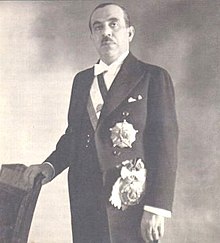Émile Eddé
Émile Eddé | |
|---|---|
 Official portrait of Émile Eddé | |
| President of Lebanon | |
| In office 11 November 1943 – 22 November 1943 | |
| Preceded by | Bechara El Khoury |
| Succeeded by | Bechara El Khoury |
| In office 20 January 1936 – 4 April 1941 | |
| Prime Minister | Khayreddin al-Ahdab Khaled Chehab Abdallah Yafi Abdallah Beyhum |
| Preceded by | Habib Pacha Saad |
| Succeeded by | Alfred Georges Naccache |
| Prime Minister of Lebanon | |
| In office 11 October 1929 – 25 March 1930 | |
| President | Charles Debbas |
| Preceded by | Bechara El Khoury |
| Succeeded by | Auguste Adib Pacha |
| Speaker of the Parliament of Lebanon | |
| In office 21 October 1924 – 13 January 1925 | |
| President | Charles Debbas |
| Preceded by | Naoum Labaki |
| Succeeded by | Moussa Namour |
| Personal details | |
| Born | Émile Ibrahim Eddé 5 May 1883 Damascus, Syria Vilayet |
| Died | 27 September 1949 Sawfar, Lebanon |
| Citizenship | Ottoman Empire (1883–1918) Arab Kingdom of Syria (1918–1920) Greater Lebanon (1920–1943) Lebanon (1943–1949) |
| Political party | National Bloc |
| Children | 3, including Raymond |
| Residence | Alexandria (1915–1918) |
| Education | Saint Joseph University Aix-Marseille University (PhD in law) |
Émile Eddé (Template:Lang-ar; 5 May 1886 – 28 September 1949) was a Lebanese Maronite Christian lawyer and politician who served as the President of Lebanon for twelve days in 1943.
Early life and education
Eddé is a member of a family that originates from Beirut which participated in the Lebanese politics mainly during the Ma'anids and Shihabs rule. He was born in Damascus, where his father, Ibrahim Eddé, was working as a translator in the French Consulate. He attended Saint Joseph University, and moved to France to study law in Aix-en-Provence, in 1902, and graduated three years later. Because of his father's health conditions, he was forced to return to Beirut in 1909, before submitting his doctoral thesis. In 1912, he was appointed as a lawyer for the French Consulate in Beirut.
Before the First World War, he sought to separate Mount Lebanon from the Ottoman Empire, for which he was sentenced to death. However, Edde was able to escape and took refuge in Alexandria. He participated in the establishment of the Eastern Unit in the French Army, which consisted of Lebanese and Syrian volunteers. During this period, he maintained contacts, with the French authorities, via his brother Joseph, residing in France.
Political career
During the period of the French Mandate in which the Republic of Lebanon functioned under the authority of a French High Commissioner, Eddé served as the speaker of the Parliament from October 1924 to January 1925,[1] prime minister of Lebanon from 11 October 1929 to 25 March 1930 and as the president of Lebanon from 1936 to 1941. On 11 November 1943, following the act of the Lebanese legislature in abolishing the Mandate, the High Commissioner installed Eddé as president. Ten days later, however, under pressure from France's other Allies in World War II, the French removed Eddé from office and restored the government of Bechara El Khoury on 21 November.,[2] and briefly in 1943.[3] He also founded and led the Lebanese National Bloc party. He was succeeded as party leader by his son Raymond Eddé.
References
- ^ (in Arabic)Republic of Lebanon – House of Representatives History
- ^ James Barr, A Line in the Sand: The Anglo-French Struggle for the Middle East, 1914-1948 (W. W. Norton & Company, 2012) pp. 244–250
- ^ "Profiles of Lebanon's presidents since independence". Lebanon Wire. 25 May 2008. Archived from the original on 20 January 2013. Retrieved 21 March 2013.
External links
- 1886 births
- 1949 deaths
- Aix-Marseille University alumni
- Lebanese Maronites
- Prime Ministers of Lebanon
- Presidents of Lebanon
- Legislative speakers of Lebanon
- Syrian Maronites
- National Bloc (Lebanon) politicians
- Political party founders
- Lebanon under French rule
- Maronites of the Ottoman Empire
- 20th-century people of the Ottoman Empire
- 19th-century people of the Ottoman Empire
- Lebanese independence activists


